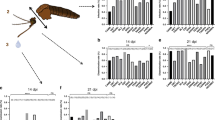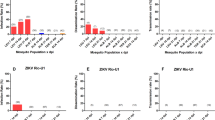Abstract
THE prevalence of Australia Au(1) antigen in apparently healthy individuals is high in the tropics and low in temperate climates1. Genetic factors have been incriminated1; but Prince2 suggested that insects might be vectors. This study was undertaken to find out the role of the common bloodsucking mosquitoes in Ibadan, Nigeria, in the transmission of Au(1) antigen.
This is a preview of subscription content, access via your institution
Access options
Subscribe to this journal
Receive 51 print issues and online access
$199.00 per year
only $3.90 per issue
Buy this article
- Purchase on Springer Link
- Instant access to full article PDF
Prices may be subject to local taxes which are calculated during checkout
Similar content being viewed by others
References
Blumberg, B. S., Sutnick, A. I., and London, W. T., Amer. J. Med., 48, 1 (1970).
Prince, A. M., Amer. J. Trop. Med. Hyg., 19, 872 (1970).
Bedariga, G., Trinchieri, G., and Carbonara, A., Hematologica, 54, 591 (1969).
Author information
Authors and Affiliations
Rights and permissions
About this article
Cite this article
SMITH, J., OGUNBA, E. & FRANCIS, T. Transmission of Australia Au(1) Antigen by Culex Mosquitoes. Nature 237, 231–232 (1972). https://doi.org/10.1038/237231a0
Received:
Revised:
Issue Date:
DOI: https://doi.org/10.1038/237231a0
This article is cited by
-
Studies on the Australia antigen
Human Genetics (1972)
Comments
By submitting a comment you agree to abide by our Terms and Community Guidelines. If you find something abusive or that does not comply with our terms or guidelines please flag it as inappropriate.



